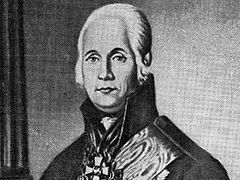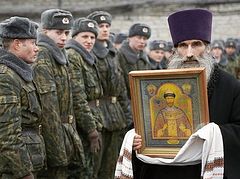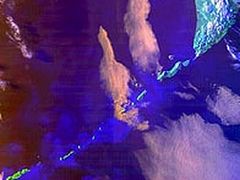July 23/August 5 is the day of commemoration of the glorification of St. Fyodor Ushakov, an admiral of the Russian navy of a brilliant undefeated career who lived a life devoted to the teachings of Christ and the services of the Church, and finished his life in the quiet peace of the Sanaksary Monastery. Below is an account of his life and glorification from Sputnik/The Voice of Russia.
* * *
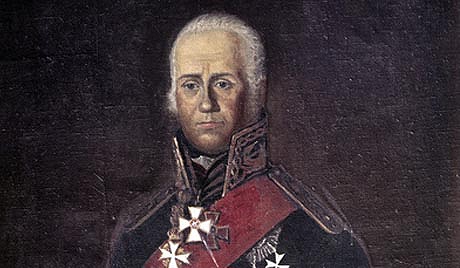
On August 5th, 2001 at the Monastery erected in honor of the Nativity of the Mother of God in Sanaksar, they glorified the blessed holy warrior Fyodor Ushakov, canonized as a local saint of the Russian Orthodox Church. This was the first appearance of a saint in shoulder-straps—a navy officer—in the Russian church calendar. For what spiritual valor did our Lord thus pay homage to this legendary admiral, who brought glory to the Russian Navy with many a victory at the end of the 18th century? To tell us this is a layman, writer Valery Ganichev, author of a number of books about Fyodor Ushakov, and in actual fact, one who stood at the source of that which led to his glorification. Asked what inspired him to turn to the life story of the great navy officer, Valery Ganichev replied:
“Upon graduating from Kiev University I worked in the town of Nikolaev, a shipbuilding center in the south of the country. This was in the distant 50’s –60’s. These places are linked with the activity of Admiral Ushakov, who participated in the grand-scale epopee of opening up the virgin southern territories—Novorossiya and the Crimea; built up the Black sea Fleet and its base—Sebastopol. In scope, this epopee could be compared to the conquering of the American Wild West or the discovery of Australia.
I was greatly interested in the personality of Fyodor Ushakov. So I started collecting material on him. Working on the books devoted to Fyodor Ushakov, I marveled at his whole-hearted nature, unwavering conformity to the Lord's commandments and selfless dedication to his homeland. I began to see farther than his military valor, recognizing the valor of the spirit, thanks to which he, in effect, became the great navy officer he was.
What kind of a man was Fyodor Ushakov? He was born in 1744 on the Volga, in the family of a military man. He was baptized in the Church of the Epiphany-on-the-Isle, as if receiving from above a blessing to “serve on water.”
His birthday, February 13th, falls between the commemoration days of two warrior-martyrs—Fyodor Stratilat, and Fyodor Tiron. This, likewise, is an omen of Ushakov's military calling. So it is hardly surprising that as a youth, he chose to join the naval corps. By God's will he was sent to the Black Sea, where in battles with the Turks the Russian Black Sea Fleet was born. It was here that his God-given talent as a naval commander was manifested in full measure. For a number of spectacular victories during the second Russian-Turkish war of 1789-1791 Ushakov was elevated to the rank of Rear Admiral and placed at the head of the Black Sea Fleet. The Turks feared him, calling him, deferentially, “Ushak-Pasha.” Finally, in the celebrated battle of Tendre in 1790 he routed the Turkish fleet and thus put an end to the Turkish domination on the expanses of the Black Sea. Thus, Russia was able to hold its own among other great seafaring nations.
In the course of his service, Ushakov participated in forty campaigns and never once suffered defeat. This is unparalleled in world history. To us today this might seem a miracle, an unbelievable stroke of good fortune. Indeed, it was a miracle, but, from the point of view of an Orthodox believer, one worked by God.
Ushakov was a profoundly religious man, always staunchly believing in our Maker's providence, convinced that He granted victory to the Orthodox warriors while all of man's skills were "nothing without divine intervention.” After each victory he ordered a service in church to thank the Lord for yet another victory granted him. Even Ushakov's ships bore names of the Saints—"Saint Pyotr", "Saint Pavel", "The Nativity of the Mother of God", etc. According to the witness of contemporaries, despite an extremely busy schedule Ushakov daily went to the church services and never undertook any activity of importance without first attending the Liturgy. And indeed, busy he was. Ushakov was involved in not only navy matters proper, but in the construction of the naval base Sebastopol. Due to his excellent administrative skills the latter was turned into a real city, with attractive stone buildings, gardens and churches.
A true Christian, Ushakov closely followed the biblical commandment "love thy neighbor as you love thyself" in all of his deeds. It is true he was at times obliged to severely reprimand his subordinates for violating naval discipline, fighting their weaknesses: inclination to heavy drinking, slatternliness, idleness, and idle talk. And yet, there was no other commander in the whole of the Russian fleet who showed such concern for the sailors, their health and proper diet. "An ill sailor will be unable to serve the Navy as he should," he would say. There were times when the fleet experienced great hardships, not receiving money from the state coffers on time, and at such moments the Admiral would dip into his own pocket. History has preserved a decree dated October 18th 1792, where it is written: "Due to lack of funds and in view of a need to ensure the good health of the men, I allot, out of my own means, thirteen thousand and five hundred roubles, of which I order that ten thousand go towards buying fresh meat, and the remaining three and a half thousand be used for the needs of the hospitals.”
We do not know if the generous impulses of the great man were ever fully reimbursed by the state from its coffers, yet Ushakov was indeed repaid for his generosity in the love and complete devotion of his sailors, ready to follow him in the face of any danger.
Unlike the famous British naval hero Admiral Nelson, Ushakov knew no defeats. Possessing an unorthodox mentality and unique sea battle tactics, Ushakov could come out victorious in the most difficult situations. One of the most striking examples of this is the capture of the island of Corfu during the Mediterranean campaign of 1799. The aggressive policy of France in this region had made Russia form a temporary union with its former enemy—Turkey—to send joint military-naval forces towards the Ionic isles with the purpose of liberating them from French domination. This foreign campaign brought Ushakov European fame.”
“In the course of practically three months,” continues Valeri Ganichev, “Ushakov liberated the Ionic isles. Their residents, predominantly Orthodox Greeks, rose up against the French and thus aided the Russians in their liberating mission. The last to fall was the island of Corfu, an impregnable fortress with a three thousand strong garrison. This was a brilliant operation that not only spread far and wide Ushakov's fame, but went down in the annals of military-naval history worldwide. For the seizure of Corfu Ushakov was granted the rank of Full Admiral.
Indeed, the residents of the isles welcomed Ushakov as a liberator and protector of Christians. On the following day after the capture of Corfu, Ushakov ordered a special service in church, in gratitude to the Lord for His benevolence and aid, and on March 27, 1799, the first day of Holy Pascha, he prescribed the organization of large festivities, inviting the clergy to make a religious procession with crosses and banners and the holy relics of St. Spyridon Trimifuntsky, profoundly revered in the Christian world. Here, on the islands, the God-loving admiral manifested yet another of his God-given talents: that of statesman and public figure. He not only ensured “peace and order" for the Greeks, but gave them one of the most democratic for that time constitutions, setting up the "Republic of the Seven Islands," opening an episcopal faculty on Corfu and inviting an Orthodox bishop, which they had not had since the sixteenth century.
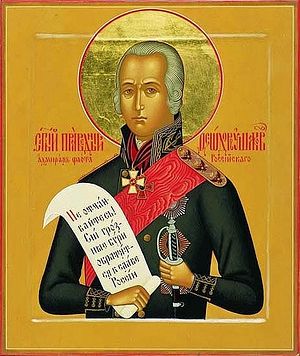
I would like to make note of one little-known fact: Ushakov's mission in the Mediterranean was not limited to the liberation of the islands. He received orders to aid, from the sea, the successful maneuvers of Field Marshal Alexander Suvorov, who was routing the troops of Napoleon in Northern Italy. Having landed in Southern Italy, Ushakov's expeditionary forces took Naples. However, soon the political situation altered and Ushakov was recalled back to Russia.
The demise of Emperor Pavel I greatly changed the Admiral's destiny. The successor to the throne, Emperor Alexander I underestimated the role of the naval forces, and as a result the outstanding talents of the naval commander were not given their due or employed any further. Then Ushakov, not without a great deal of anxiety and torment of the soul made the decision to retire. He settled on an estate in central Russia, not far from the Sanaksary Monastery, where lie the remains of its first Father-Superior, his uncle, also an Ushakov.
Having once chosen a seafaring career, Ushakov never set up a family of his own, remaining a confirmed bachelor. According to his contemporaries, "neglecting all society dazzle and bustle, the Admiral did not close his heart to his fellow men. With the fervor that he once displayed in serving his Motherland, he now rushed to the aid of all those who came to him."
He donated generous amounts towards the treatment of all retired sailors and veterans of the war with Napoleon in 1812, as well as people who found themselves destitute, without a roof over their heads or the bare necessities. His adjutant, a former sailor, would grumble: "There's no stocking up for all these in want, soon we shall have nothing left for ourselves!” The Admiral would pat him on the shoulder, reminding the fellow that "if even in a minor way" one needs to help others worse off than you.
He also contributed greatly to the Sanaksary Monastery, at times living there for lengthy periods, praying in his own solitary cell, recalling all his deceased one-time comrades-in-arms, relatives, and people accidentally met on the road. Thus, in prayer and mercy he lived out his final days. Ushakov died in 1817, at the age of 74, and was buried at the Sanaksary Monastery. Paying tribute to the memory of this great man, the local papers wrote: "You knew him as a great naval commander, we knew him for his outstanding charity to others."
"I knew so much about Fyodor Ushakov, and finally came to the conclusion that the church should address its attention to the life story of this God-fearing, charitable and honorable man. In 1995 I wrote to the holy Patriarch of Moscow and All Russia Alexi II, with this initiative. During our personal meeting the Patriarch supported my proposal and asked that the materials be transferred for further study to the Synodal Commission on the canonization of Saints and Martyrs. His Holiness added that the Church showed great care and subtlety in deliberating such issues, and he hoped that the Russian fleet would soon acquire its holy patron.
The aforementioned commission worked during the course of five years, gathering testimonies, witness accounts, documents, and facts pointing to the occurrence of a miracle. And finally, as the Lord would have it, on November 30, 2000 a decision was made to canonize Fyodor Ushakov as a local saint of the Saransk Eparchy,” said Valeri Ganichev.
Any canonization is the testimony of the Church to the holy nature of the believer. Thus the Church not only pays due homage to the deeds and life of the saint, but also calls on all of the Orthodox believers to follow in the footsteps of holy people, and to learn and imitate their good deeds. And still, on what facts did the holy Church base its ultimate decision to canonize Ushakov? A member of the Synodal Commission on Canonization, Archpriest Maxim Maximov explains:
“As is known, the grounds for canonization are as follows: a staunch dedication to one's professed faith, and preparedness to defend that faith to the grave—thus the martyrs are glorified; a life of virtuous deeds in humility, that is, along the road to salvation—thus the pious noblemen, the clergy, the devout believers are glorified. If we take a close look at the life led by Admiral Ushakov, we shall see what a truly remarkable life it was. A man of high, noble rank, he was in essence a devout Christian and was able to remain such despite the fact that the society he lived in at the time was not noted for its Christian norms. This was the rule of Catherine II, who, putting it mildly, conducted an anti-Church policy.
Ushakov’s Christian nature was manifested, first and foremost, in the way he relied on God's providence in all of his deeds, as a recourse in all circumstances, and, indeed, it saved him, and not only him. Never losing a battle, not one of his sailors or ships was ever taken prisoner. This is almost inconceivable. We are all aware of how precious little a man's life is worth at times of war; how people, wielding great power, tend to settle other people’s lives as though they were alien to them. Ushakov, though, in conditions of war, nonetheless was an example of true Christian faith. His prime task was not to secure victory at all costs, but to do so by preserving the lives of those entrusted unto him. Driven by this faith, he cared for them in difficult circumstances, and, moreover, displayed unbelievable clemency towards his enemies. When the Russian and Turkish forces jointly liberated Corfu from the French, the admiral paid the Turks a ransom for every one of the captured Frenchmen.
Generally, this was a man who all of his life thought liturgically, i.e. he never took a single important decision without attending the Liturgy at church. What other commander ever does that, all the more so in conditions of war?!
Admiral Ushakov was canonized not for his military heroism—this isn’t enough in itself for canonization—but for the way he managed to convey the image of a true Christian in conditions of battle, serving his duty on the frontlines, yet always ready, as he did on more than one occasion, to sacrifice his life for others. This is why his memory lived on among the people.
Even in Soviet times, the highest of awards for the sailors was the Order of Admiral Ushakov.”
“I would like to remark on yet another aspect of his life,” says Maxim Maximov. “Never having married, he remained, consciously virginal and a faster. In other words, he professed Christian virtues in reality, not just as words on paper. This was his personal vision of life according to the Bible: once a person had decided not to marry, it signified that he should dedicate his life to God's service. Such was the main preoccupation in the later years of his life, which ended at the monastery, not due to the whim of a wealthy person, but by private conviction. This is how he saw his taking leave of this world, and he found peace and sanctuary in this," said Archpriest Maxim. When asked whether there had been note of any miracles connected with Ushakov's name, he answered the following: “There were, at minimum, two miracles of an overall Church significance. The first being the fact that, due to strong belief in God's providence Ushakov did not lose a single battle in war time. Secondly, thanks to Ushakov, the Sanaksary Monastery was saved from imminent danger of destruction. I am referring to the monastery that he linked his life with, and where he was buried. This is no minor fact, since there are testimonies proving that the monastery was threatened with complete annihilation. There are also testimonies of people who, upon praying and addressing their supplications to him, received help and benediction.
Touching upon the significance of Ushakov's canonization for modern-day man, Father Maxim stressed:
“Every time has a demand for its own saints. This is not to say that it searches for them, finding them with difficulty. Society simply matures enough to be able to assess and give due credit to one's deeds and valor. In our time of shattered values and ideals, Ushakov's valor of spirit is important as an ideal, an example for today's military, showing that it is quite possible to combine zealous military service with true Christian devotion and love for one's neighbor. Without a shining example it is impossible to emulate these Christian virtues. However, the Lord is always watching over us, presenting before us worthy, pious saints that serve to bear witness to the Gospel truths and wisdoms. He, who is willing to listen shall hear,” said Father Maxim.
The glorification of the blessed warrior Fyodor Ushakov in the assembly of Russian saints became a noteworthy event in the life of the Church. Hundreds of believers came in August 2001 to the Sanaksary Monastery in order to take part in the solemn festivities. We continue with an account of the event by Valeri Ganichev, a participant of the latter:
“Present for the glorification of Fyodor Ushakov were seven admirals, commanders of all of Russia's fleets, the clergy, monks, pilgrims, and secular attendants. When the admirals emerged from the chapel bearing on their shoulders the coffin containing Ushakov's relics the heavy clouds that had been shrouding the sky suddenly parted, letting through a radiant shaft of sunlight that illuminated the procession. Everyone exclaimed! It was a miracle! The orchestra began to play. The coffin with the relics of the admiral was placed onto a special platform. At that moment, for some reason, there was no shroud to cover him with. Then the commander of the Black Sea Fleet removed the flag of the Black Sea Fleet from its staff and used it as a shroud over the relics. In this too was the hand of God, for a great admiral ought to lie under the flag that he served.
In the center of the monastery a tent was set up containing icons; the glorification took place here. This was an unforgettable sight:
200 clergymen in golden robes, with prayers and chants glorified the blessed Ushakov. After the glorification, his relics were kissed. On the following day, a Liturgy was served in his honor as a saint.
By God’s providence I was the sole witness to how the relics of the saint were placed into a shrine made in the shape of a ship. Possibly this was due to the fact that, although a layman, I had chanced to stand at the fountainhead of the glorification. From now on the shrine of Admiral Ushakov stands next to that of his uncle, the first Father Superior of the Monastery, also Fyodor Ushakov, earlier glorified as a local saint. Two saints of the Ushakov family brought glory to their Motherland, each in his chosen walk of life: one—that of the Church, the other—that of the Military.
“The Russian fleet has received a patron saint,” says Valeri Ganichev, “and I hope from now on one will be able to see an icon of the blessed warrior Fyodor Ushakov in crew-quarters, so that sailors might address their prayers to him.”

